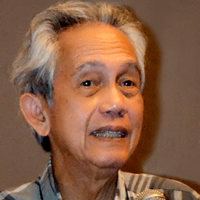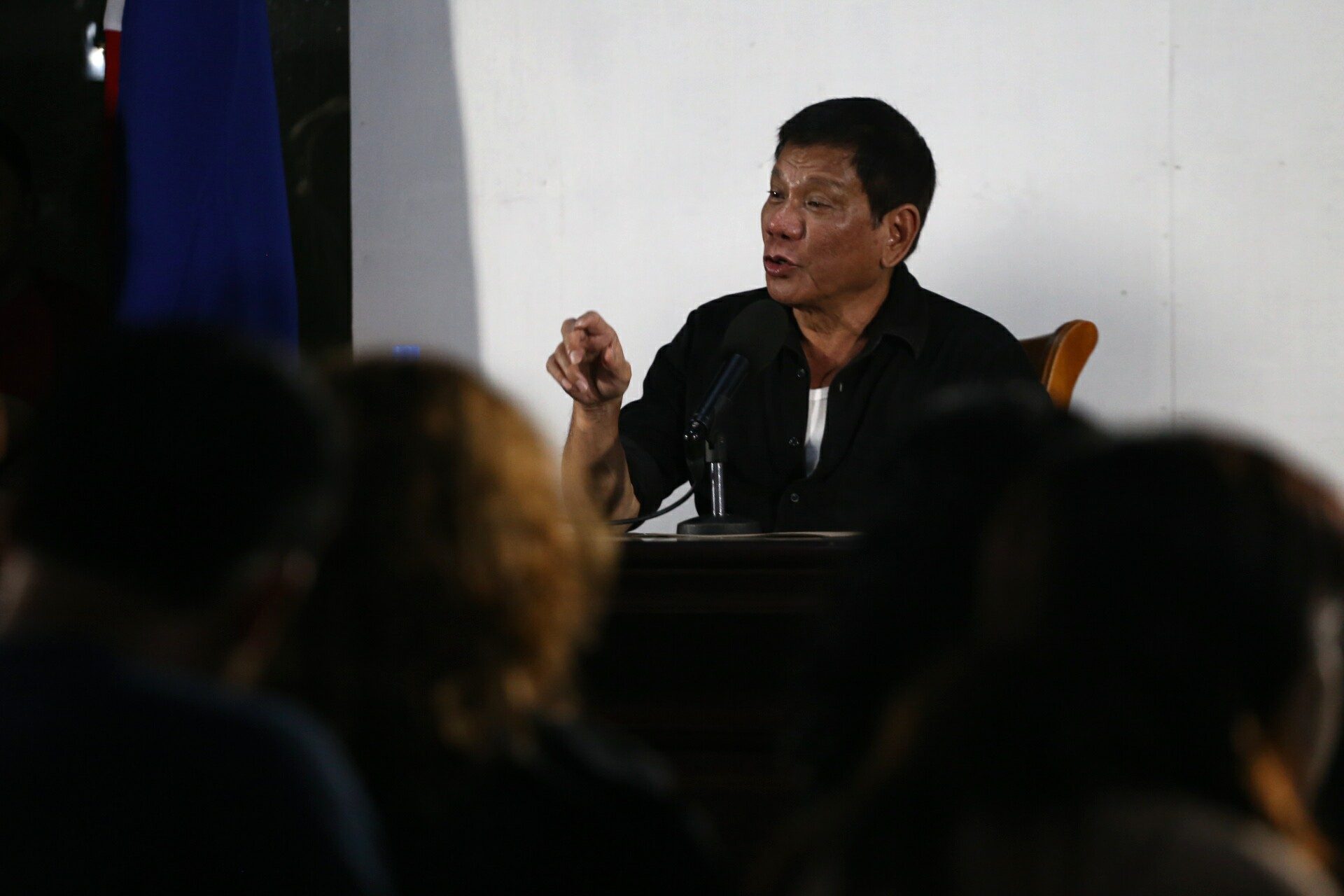SUMMARY
This is AI generated summarization, which may have errors. For context, always refer to the full article.
 It is hard to resist blaming our people for Rodrigo Duterte. It’s not just that he won by a landslide. Millions of people have placed their hopes for a better future on him. We have no choice but to confront the ideas he has put out for shaping that future. But he makes it difficult to go beyond his self-indulgent bragging, his insistence on publicly airing his maleness by demeaning women.
It is hard to resist blaming our people for Rodrigo Duterte. It’s not just that he won by a landslide. Millions of people have placed their hopes for a better future on him. We have no choice but to confront the ideas he has put out for shaping that future. But he makes it difficult to go beyond his self-indulgent bragging, his insistence on publicly airing his maleness by demeaning women.
Leni Robredo is the perfect antithesis of Duterte’s misogyny, his hatred of women. Where Duterte is a loud braggart, Leni is tranquilo – a few words, a shy smile and she gets her point across. Her victory is as amazing as Duterte’s. It’s hard to imagine that they both come out of the same pit of resentment and anger where many of our people live their lives day in, day out.
This was more than an election that picked our leaders. It is a warning to all our leaders, winners and losers alike, that things cannot remain as they are. Mar Roxas is the best president we never had. He had the misfortune of being perceived as representing the way things are, more than daang matuwid, the kind of society where the more the economy grows, the more frustrated the poor become.
To be fair, more has been done for the poor under the Aquino administration than at any time under any one regime, even the last 4 of them taken together. The problem is that PNoy’s personality, Mar’s for that matter – their way of doing things, made it difficult for them to reach the poor even as they accumulated projects and programs for them. They resisted, would not even know the first thing about, populism.
I do not know if Duterte is a conscious populist. His oversized personality, his self-absorption makes him a perfect populist. On one side of his macho personality, his preoccupation with women, on the other, not unrelated, with violence. It is the people’s fear for their personal safety that Digong is responding to. A populist is not accountable. All he has to do is (re)present in his words and actions the people’s fears, anger, and hopes. A President Rodrigo Duterte, however, is accountable.
Unsaon pod lamang
In Siquijor, we say unsaon pod lamang, accept what we cannot reverse, make the best of it. If you can cut through Digong’s populist bluster, you will find a number of, actually not policies, more like policy thrusts. These are not necessarily implementable, but could set things into motion. Take his constant refrain, drug lords and police who protect them, beware. It would be nice if drug lords actually got scared and stopped operating. More likely, small time dealers and their teenage runners will get targeted.
It’s not as if police are new to extrajudicial killings. They cannot be blamed if they believe that the statements of Duterte have given them carte blanche to kill as many drug lords as they can. Outside of police killings, vigilante groups, often out of uniform police, will have even less restrictions. The problem for Duterte is that he does not have the kind of control over the national situation as he had in Davao City.
There are more doable things in police reform. Because police were ill-equipped and poorly paid, the Philippine National Police (PNP) for many became a platform for sharing profits with criminals. But much has already been done in police reform. The PNP is a more professional agency. Its image has moved beyond the potbellied policeman. Digong can consolidate these gains by following through on raising police salaries, and identifying those 3 corrupt police generals he talked about.

If the Duterte administration achieves nothing else except conclude a political settlement with the National Democratic Front (NDF), it will have made a major contribution. Duterte’s experience in crafting a “working arrangement” with the Davao City NPA, and his appointment of NDF nominees to Cabinet and sub-Cabinet positions, have created better political conditions for peace talks than in the preceding administrations. All indications are that Joma Sison is anxious to conclude talks that will enable him to return from exile.
Whether Sison can get the local NPA to agree is another matter. If Benny and Wilma Tiamzon, who are not as enthusiastic about peace talks as Sison, are released, will they go along at the pace that Sison wants? A ceasefire should be relatively easy, but what “cantonment” means, will local NPA agree to remain in identified camps, is going to be difficult. The situation in Caraga, where Duterte wants an end to illegal mining, provides an example of difficulties. Can Duterte and Sison persuade the military and the NPA who protect illegal mining to forego their millions in protection money?
I do not understand what considerations underlie Duterte and his people’s seeming hesitation on finalizing political settlement with the Moro Islamic Liberation Front by pushing for the passage of the BBL. Waiting for constitutional amendments shifting the government from unitary to federal will take many years, and will not address the historical injustices to the Moro people. It’s also curious that neither Digong nor his people have said much about Mindanao development. Surely it’s not enough to stick a dirty finger at Imperial Manila.
While waiting for constitutional reform, there are many things that the Duterte administration can do to transfer more power and resources to local governments. They can retain Bottom-up Budgeting (BuB) for a start. Cutting it as Cabinet designate Ben Diokno reportedly suggests would risk the opposition of mayors. Poverty can be added to the formula for Internal Revenue Allotments (IRA). The long delayed review of the Local Government Code can be organized even as the more radical federalism proposal is being discussed.
There are many reforms that Digong and his people have supported, from FOI to mining to K+12. His economic team – Sonny Dominguez, Ernie Pernia and Ben Diokno – is strong and will likely continue the economic reforms of the PNoy administration. What people worry about is the volatility of Duterte’s rhetoric. It’s not just his cussing, it’s also how Duterte will navigate the demands of his allies on the Left and the Right. We can always hope for the best. In Siquijor, we go from unsaon pod lamang to hope, bason pod lamang.
Leni can help. With characteristic generosity, she says Duterte can expect 100% support. It may be best that she will not be in the Cabinet where she will be expected to provide undifferentiated support. From outside the Cabinet, but with the authority of her mandate as number two, she can provide critical collaboration, or if necessary, an alternative. – Rappler.com
Joel Rocamora is a political analyst and a seasoned civil society leader who has been working on issues of democracy, governance, and social movements for several decades. An activist-scholar, he finished his PhD in Politics, Asian Studies, and International Relations in Cornell University, and had been the head of the Institute for Popular Democracy, the Transnational Institute, the Akbayan Citizens’ Action Party, and member to a number of non-governmental organizations. From the parliament of the streets, he crossed over to the government and joined Aquino’s Cabinet as the Lead Convenor of the National Anti-Poverty Commission.
Add a comment
How does this make you feel?
There are no comments yet. Add your comment to start the conversation.